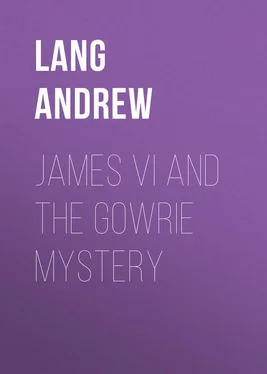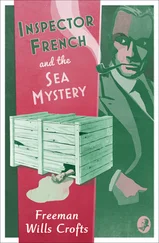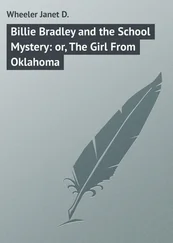Andrew Lang - James VI and the Gowrie Mystery
Здесь есть возможность читать онлайн «Andrew Lang - James VI and the Gowrie Mystery» — ознакомительный отрывок электронной книги совершенно бесплатно, а после прочтения отрывка купить полную версию. В некоторых случаях можно слушать аудио, скачать через торрент в формате fb2 и присутствует краткое содержание. Жанр: foreign_antique, foreign_prose, на английском языке. Описание произведения, (предисловие) а так же отзывы посетителей доступны на портале библиотеки ЛибКат.
- Название:James VI and the Gowrie Mystery
- Автор:
- Жанр:
- Год:неизвестен
- ISBN:нет данных
- Рейтинг книги:5 / 5. Голосов: 1
-
Избранное:Добавить в избранное
- Отзывы:
-
Ваша оценка:
- 100
- 1
- 2
- 3
- 4
- 5
James VI and the Gowrie Mystery: краткое содержание, описание и аннотация
Предлагаем к чтению аннотацию, описание, краткое содержание или предисловие (зависит от того, что написал сам автор книги «James VI and the Gowrie Mystery»). Если вы не нашли необходимую информацию о книге — напишите в комментариях, мы постараемся отыскать её.
James VI and the Gowrie Mystery — читать онлайн ознакомительный отрывок
Ниже представлен текст книги, разбитый по страницам. Система сохранения места последней прочитанной страницы, позволяет с удобством читать онлайн бесплатно книгу «James VI and the Gowrie Mystery», без необходимости каждый раз заново искать на чём Вы остановились. Поставьте закладку, и сможете в любой момент перейти на страницу, на которой закончили чтение.
Интервал:
Закладка:
III. THE KING’S OWN NARRATIVE
So far we have not gained any light on the occurrences of the mysterious interval between the moment when the King and Alexander Ruthven passed alone through the hall, after dinner, up the great staircase, and the moment when the King cried ‘Treason!’ out of the turret window. In the nature of the case, the Master being for ever silent, only James could give evidence on the events of this interval, James and one other man , of whose presence in the turret we have hitherto said little, as only one of the witnesses could swear to having seen a man there, none to having seen him escaping thence, or in the tumult. Now the word of James was not to be relied on, any more than that of the unequalled Elizabeth. If we take the King’s word in this case, it is from no prejudice in his favour, but merely because his narrative seems best to fit the facts as given on oath by men like Lennox, Mar, and other witnesses of all ranks. It also fits, with discrepancies to be noted, the testimony of the other man , the man who professed to have been with the Master and the King in the turret.
The evidence of that other man was also subject, for reasons which will appear presently, to the gravest suspicion. James, if himself guilty of the plot, had to invent a story to excuse himself; the other man had to adopt the version of the King, to save his own life from the gibbet. On the other hand, James, if innocent, could not easily have a credible story to tell. If the Master was sane, it was hardly credible that, as James averred, he should menace the King with murder, in his brother’s house, with no traceable preparations either for flight or for armed resistance. In James’s narrative the Master is made at least to menace the King with death. However true the King’s story might be, his adversaries, the party of the Kirk and the preachers, would never accept it. In Lennox’s phrase they ‘liked it not, because it was not likely.’ Emphatically it was not likely, but the contradictory story put forward by the Ruthven apologist, as we shall see, was not only improbable, but certainly false.
There was living at that time a certain Mr. David Calderwood, a young Presbyterian minister, aged twenty-five. He was an avid collector of rumour, of talk, and of actual documents, and his ‘History of the Kirk of Scotland,’ composed at a much later date, is wonderfully copious and accurate. As it was impossible for King James to do anything at which Calderwood did not carp, assigning the worst imaginable motives in every case, we shall find in Calderwood the sum of contemporary hostile criticism of his Majesty’s narrative. But the criticism is negative. Calderwood’s critics only pick holes in the King’s narrative, but do not advance or report any other explanation of the events, any complete theory of the King’s plot from the Ruthven side. Any such story, any such hypothesis, must be to the full as improbable as the King’s narrative.
There is nothing probable in the whole affair; every system, every hypothesis is difficile à croire . Yet the events did occur, and we cannot reject James’s account merely because it is ‘unlikely.’ The improbabilities, however, were enormously increased by the King’s theory that the Ruthvens meant to murder him. This project (not borne out by the King’s own version of Ruthven’s conduct) would have been insane: the Ruthvens, by murdering James, would have roused the whole nation and the Kirk itself against them. But if their object was to kidnap James, to secure his person, to separate him from his Ministers (who were either secretly Catholics, or Indifferents), and to bring in a new administration favourable to Kirk, or Church, then the Ruthvens were doing what had several times been done, and many times attempted. James had been captured before, even in his own palace, while scores of other plots, to take him, for instance, when hunting in Falkland woods, remote from his retinue, had been recently planned, and had failed. To kidnap the King was the commonest move in politics; but as James thought, or said, that the idea at Gowrie House was to murder him, his tale, even if true, could not be easily credible.
The first narrative was drawn up at Falkland in the night of August 5. Early on August 6 the letter reached the Chancellor in Edinburgh, and the contents of the letter were repeated orally by the Secretary of State (Elphinstone, later Lord Balmerino) to Nicholson, the English resident at the Court of Holyrood. Nicholson on the same day reported what he remembered of what the Secretary remembered of the Falkland letter, to Cecil. Yet though at third hand Nicholson’s written account of the Falkland letter of August 5 12 12 Quoted by Pitcairn, ii. 209. The Falkland letter, as we show later, was probably written by David Moysie, but must have been, more or less, ‘official.’ Cf. p. 100, infra .
contains the same version as James later published, with variations so few and so unessential that it is needless to dwell upon them, they may safely be attributed to the modifications which a story must suffer in passing through the memories of two persons. Whatever the amount of truth in his narrative, the King had it ready at once in the form to which he adhered, and on which he voluntarily underwent severe cross-examination, on oath, by Mr. Robert Bruce, one of the Edinburgh ministers; a point to which we return.
James declares in a later narrative printed and published about the end of August 1600, that the Master, when he first met him at Falkland, made a very low bow, which was not his habit. The Master then said (their conference, we saw, occupied a quarter of an hour) that, while walking alone on the previous evening, he had met a cloaked man carrying a great pot, full of gold in large coined pieces. Ruthven took the fellow secretly to Gowrie House, ‘locked him in a privy derned house , and, after locking many doors on him, left him there and his pot with him.’
It might be argued that, as the man was said to be locked in a house , and as James was not taken out of Gowrie House to see him, James must have known that, when he went upstairs with the Master, he was not going to see the prisoner. The error here is that, in the language of the period, a house often means a room , or chamber. It is so used by James elsewhere in this very narrative, and endless examples occur in the letters and books of the period.
Ruthven went on to explain, what greatly needed explanation, that he had left Perth so early in the morning that James might have the first knowledge of this secret treasure, concealed hitherto even from Gowrie. James objected that he had no right to the gold, which was not treasure trove. Ruthven replied that, if the King would not take it, others would. James now began to suspect, very naturally, that the gold was foreign coin. Indeed, what else could it well be? Coin from France, Italy, or Spain, brought in often by political intriguers, was the least improbable sort of minted gold to be found in poor old Scotland. In the troubles of 1592–1596 the supplies of the Catholic rebels were in Spanish money, whereof some was likely enough to be buried by the owners. James, then, fancied that Jesuits or others had brought in gold for seditious purposes, ‘as they have ofttimes done before.’ Sceptics of the period asked how one pot of gold could cause a sedition. The question is puerile. There would be more gold where the potful came from, if Catholic intrigues were in the air. James then asked the Master ‘what kind of coin it was.’ ‘They seemed to be foreign and uncouth’ (unusual) ‘strokes of coin,’ said Ruthven, and the man, he added, was a stranger to him.
James therefore suspected that the man might be a disguised Scottish priest: the few of them then in Scotland always wore disguises, as they tell us in their reports to their superiors. 13 13 Many of these may be read in Narratives of Scottish Catholics , by Father Forbes-Leith, S.J.
The King’s inferences as to popish plotters were thus inevitable, though he may have emphasised them in his narrative to conciliate the preachers. His horror of ‘practising Papists,’ at this date, was unfeigned. He said to the Master that he could send a servant with a warrant to Gowrie and the magistrates of Perth to take and examine the prisoner and his hoard. Contemporaries asked why he did not ‘commit the credit of this matter to another.’ James had anticipated the objection. He did propose this course, but Ruthven replied that, if others once touched the money, the King ‘would get a very bad account made to him of that treasure.’ He implored his Majesty to act as he advised, and not to forget him afterwards. This suggestion may seem mean in Ruthven, but the age was not disinterested, nor was Ruthven trying to persuade a high-souled man. The King was puzzled and bored, ‘the morning was fair, the game already found,’ the monarch was a keen sportsman, so he said that he would think the thing over and answer at the end of the hunt.
Интервал:
Закладка:
Похожие книги на «James VI and the Gowrie Mystery»
Представляем Вашему вниманию похожие книги на «James VI and the Gowrie Mystery» списком для выбора. Мы отобрали схожую по названию и смыслу литературу в надежде предоставить читателям больше вариантов отыскать новые, интересные, ещё непрочитанные произведения.
Обсуждение, отзывы о книге «James VI and the Gowrie Mystery» и просто собственные мнения читателей. Оставьте ваши комментарии, напишите, что Вы думаете о произведении, его смысле или главных героях. Укажите что конкретно понравилось, а что нет, и почему Вы так считаете.












